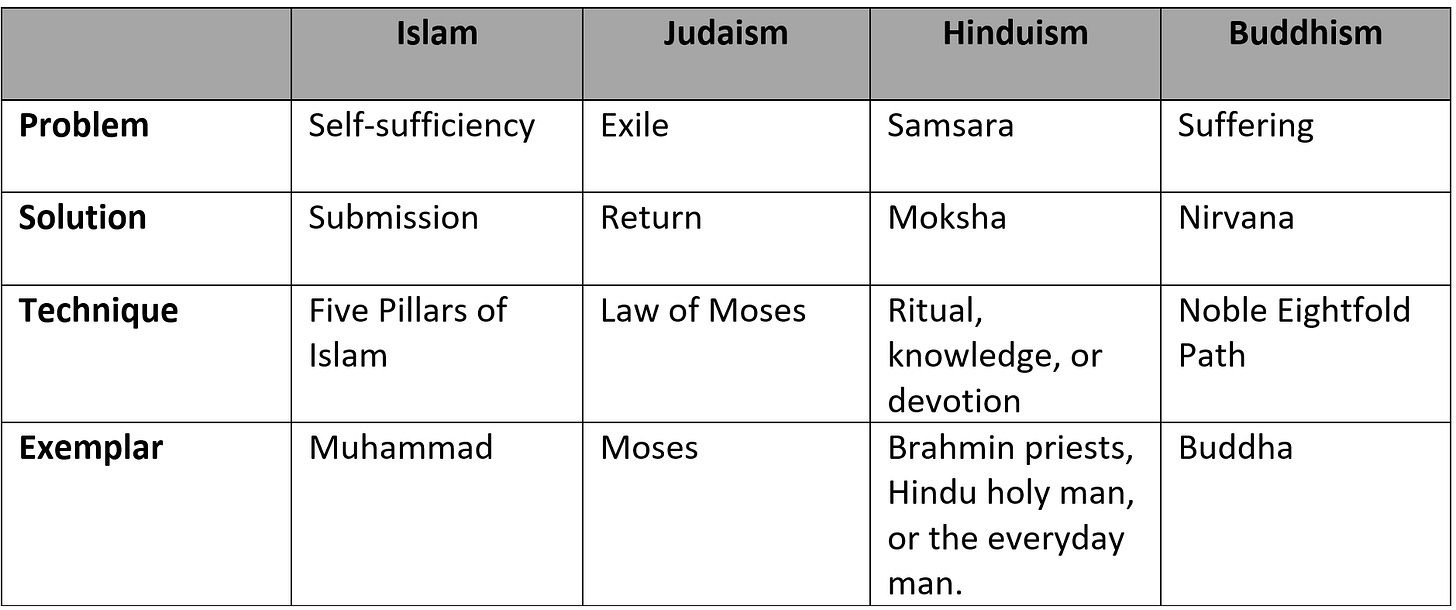In this month’s Roundtable discussion, the team is tackling topics related to other religions (see Part 1 by Paul Copan on Islam). Paul M. Gould continues the series with some big-picture reflections on engaging with other religions.
For the Kingdom,
Christopher Reese
Editor-in-Chief
In the 1960s, sociologists predicted that culture would become secular by the turn of the century. These same sociologists now admit that they were mistaken. Society is not secular. It is deeply religious. They now admit we live in a post-secular age.[1] In the 21st century, religion will be one of the dominant forces on the planet. And of course, this makes sense. Man is inherently religious. We naturally worship whatever is ultimate in our lives. And for many—both in history and today—belief in God has been a natural and fitting expression of this deep longing for a transcendent reality. It is also for this reason that Keith Loftin, Travis Dickinson, and I included a chapter on world religions in our introductory apologetics book called Stand Firm.
In this month’s Roundtable discussion, we are considering the idea of engaging other religions. Instead of talking about a specific religion, I want to reflect on two ideas. First, I want to provide a framework for understanding the big picture. Second, I want to reflect a bit on the beauty of the gospel in light of the world religions.
I’ve found Stephen Prothero’s work on the religions of the world very helpful.[2] In his book God is Not One, Prothero helpfully discusses eight rival religions, highlighting for each their differences concerning man’s fundamental problem, the solution to that problem, the techniques required to achieve that solution, and exemplars of the faith. With respect to the other major world religions (besides Christianity), I’ve found the following graphic helpful to understand the big picture:[3]
This chart helps us to see the distinctives of each world religion as well as their differences from Christianity.
This way of framing the discussion about world religions also helps us see a key difference between the world religions and Christianity. Notice that for each world religion listed above, man must earn his way to salvation. On this point, Christianity is fundamentally different. For according to Christianity, man cannot work his way into heaven. Rather, salvation is a gift from God, accomplished by the work of Another—Jesus. In this way, Christianity is unique in the face of the world religions. It is the only religion that says, in effect, you cannot earn your salvation. It is all grace. It is all gift. As Timothy Keller helpfully describes the situation, Christianity offers a “third way.” It is not irreligion: “I will find salvation apart from God,” or religion: “I will earn my way to God,” but grace: “My salvation is a gift from God as I trust in Jesus.” In this way, we see the beauty of the gospel. It is the only religion, of all the religions on offer, that tell us we are saved apart from works. And this is truly good news: in love, God sent his Son, so that we could find forgiveness from our sins and union with him, not because of what we’ve done, but because of Jesus.
Notes
[1] Douglas Jacobsen and Rhonda Hustedt Jacobsen, “Postsecular America: A New Context for Higher Education,” The American University in a Postsecular Age, ed. by Douglas Jacobsen and Rhonda Hustedt Jacobsen (Oxford: Oxford University Press, 2008), 10. But see also J. V. Langmead, who argued in 1952 that the period of retreat into irreligion or secularism was drawing to a close. He thought the danger of retreat from Christianity to irreligion was less dangerous than the retreat from Christianity into another religion: “The retreat from Christianity into irreligion does no more than create a spiritual vacuum, but the retreat from Christianity into religion may do something far more terrible and menacing to the future of mankind: it may fill that vacuum, fill it with reborn superstitions and mythologies, giving new life to the paganisms and idolatries, so recklessly sacrificial of human life and energies, from which the gospel once delivered us, and may now have to deliver us all over again” (Langmead, The Retreat From Christianity in the Modern World [London: Longmans, Green and Co, 1952], 5; quoted in Dallas Willard, Renovation of the Heart [Colorado Springs, CO: Navpress, 2002], 261 FN 1).
[2] Stephen Prothero, God Is Not One (New York: HarperOne, 2010).
[3] This graphic is from our book Stand Firm. For the details, consult our chapter on world religions.
— Paul M. Gould is an Associate Professor of Philosophy of Religion and Director of the M.A. Philosophy of Religion program at Palm Beach Atlantic University. He is the author or editor of ten scholarly and popular-level books including Cultural Apologetics, Philosophy: A Christian Introduction and The Story of the Cosmos. He has been a visiting scholar at Trinity Evangelical Divinity School’s Henry Center, working on the intersection of science and faith, and is the founder and president of the Two Tasks Institute. You can find out more about Dr. Gould and his work at Paul Gould.com and the Two Tasks Institute. He is married to Ethel and has four children.
Image by S. Hermann & F. Richter from Pixabay
If you find our weekly free articles helpful, we encourage you to become a subscriber to our monthly newsletter. The support of our subscribers and patrons make The Worldview Bulletin possible. If you’d like to grow in your ability to articulate and defend the Christian worldview, and support our work defending Christianity at the highest levels, we invite you to become a subscriber.
Receive a free year of The Worldview Bulletin!
Would you like to receive 12 free months of The Worldview Bulletin? The first 5 readers who send us a short testimonial (a single paragraph is fine) of how you benefit from our work will receive a free year’s subscription. We’ll use these testimonials to promote the Bulletin in various venues (by sending a testimonial, you grant us permission to use it online or elsewhere). Please send yours to worldviewbulletin@gmail.com. Thanks!





